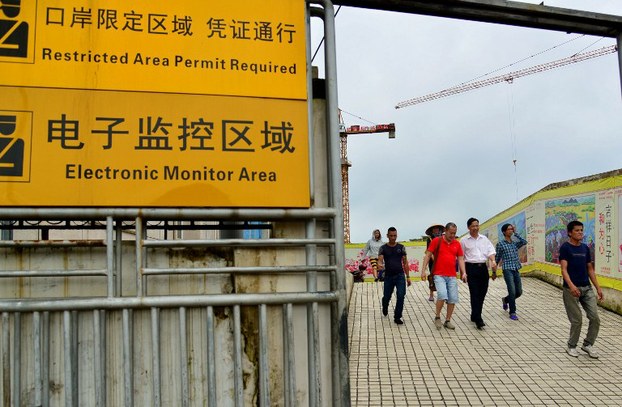Chinese ships evacuate workers amid calls for compensation
| Publisher | Radio Free Asia |
| Publication Date | 19 May 2014 |
| Cite as | Radio Free Asia, Chinese ships evacuate workers amid calls for compensation, 19 May 2014, available at: https://www.refworld.org/docid/5391ba1a14.html [accessed 8 June 2023] |
| Disclaimer | This is not a UNHCR publication. UNHCR is not responsible for, nor does it necessarily endorse, its content. Any views expressed are solely those of the author or publisher and do not necessarily reflect those of UNHCR, the United Nations or its Member States. |
2014-05-19
 Chinese citizens return across the border from Vietnam to China's Guangxi Zhuang Autonomous Region, May 18, 2014. ImagineChina
Chinese citizens return across the border from Vietnam to China's Guangxi Zhuang Autonomous Region, May 18, 2014. ImagineChina
Chinese passenger ships on Monday evacuated nearly 2,000 expatriate workers from Vietnam after days of rioting and violence targeting Chinese and Taiwanese-owned factories and businesses left at least two dead and more than 140 injured, official media reported.
As the Wuzhishan and Tongguling left Vung Ang port with a full complement of 900 Chinese workers on board, two more ships were on the way to pick up others still anxious to leave, as the Vietnamese government moved to quell further protests and attacks on foreign investors, Xinhua news agency reported.
Two more ships were standing by in case of further demand, after governments and airlines in China and Taiwan chartered ships and aircraft to evacuate more than 3,000 mainland Chinese and Taiwanese over the weekend, reports said.
Meanwhile, Chinese media hit out at Hanoi for not doing more to prevent the violence in the first place, and frightening off much-needed foreign investment.
"If investors are not confident a government can guarantee a secure investment environment, they will understandably hesitate over making the decision to invest," the English-language China Daily newspaper said in an editorial on Monday.
"To stay or not to stay is now the question for those who already have factories in the Southeast Asian country," it said.
Evacuated south
A mainland Chinese migrant worker surnamed Wen said he was evacuated to Ho Chi Minh City amid the attacks, under police escort.
"We were brought out under police escort in a closed vehicle, otherwise we wouldn't have got out," Wen said, adding he and his fellow travelers were awaiting return to China.
"We are still in Ho Chi Minh City, in Saigon," he said.
He said mobs of rioters had attacked a number of factories at his previous location.
"They looted, took everything, and set fire to factories belonging to mainland-owned Midea and General Electrics, as well as a Taiwan-owned bicycle manufacturer and a furniture store," Wen said.
He criticized the ruling Chinese Communist Party for not evacuating Chinese workers sooner.
"The mainland government's response has been so disappointing," Wen said. "They did nothing."
Prevented from leaving
However, a worker for the Hubei No. 2 Electrical Construction Co. based in the southern Vietnamese province of Binh Thuan said workers there had been prevented from leaving by management.
"More than 10 of us were injured [in attacks] but they have deleted this information," the worker, who gave only a nickname, A Ming, said.
"We wanted to be repatriated because of the incident in which people were injured, but our leaders refused to hand back our passports, so we couldn't," he said.
A mainland Chinese evacuee surnamed Li who once worked at the Hanoi offices of a Taiwan-Singaporean welding joint-venture said two of the company's facilities had sustained severe damage in last week's riots.
"I am still in Hanoi right now, where the Vietnamese army and police are patrolling the streets," Li said. "There are also troops outside the [Chinese] embassy."
"I should get back [to China] tomorrow morning," he said.
He said his company had sustained economic losses of 20-30 million yuan (U.S. 3.2-4.8 million) in the riots.
"They will definitely be protesting about this, and demanding compensation," Li said. "They are leaving all the stuff smashed up like it is, to use as evidence."
Other attacks
Around 400 other factories around the country were damaged or destroyed after mobs tore through industrial parks close to southern Ho Chi Minh City.
However, gangs intent on looting also targeted factories owned by Chinese from elsewhere in Asia, particularly Taiwan, a democratic island governed separately from Beijing.
The riots came after the Vietnamese government tolerated initial "patriotic" protests at China's deployment of an oil rig near a disputed island chain in the South China Sea.
Since Thursday, Vietnamese security personnel have been out in force, as Hanoi rapidly backpedaled on its stance amid the spread of violence.
A bid to stage fresh demonstrations against the rig was stymied by the authorities on Sunday.
Official Vietnamese media announced that "the situation has returned to normal" across the country on Monday.
Oil rig
Beijing's deployment of the rig on May 1 near the Paracel Islands some 220 kilometers (140 miles) off of Vietnam's coast saw patrol vessels from the two countries converging in the disputed area, sending tensions spiraling.
The ships have skirmished repeatedly in recent days, causing collisions and the use of water cannon.
Beijing's decision to set up the rig is seen as one of its boldest moves yet in a bid to secure its claims in the South China Sea, which is known in Vietnam as the East Sea.
Dozens of anti-China rallies have been held in Vietnam since 2007 against perceived aggression by Beijing in the waters.
China claims almost the entire South China Sea, rejecting rival claims from Vietnam, the Philippines, Taiwan, Malaysia, and Brunei.
Reported by Qiao Long for RFA's Mandarin Service, and by Wen Yuqing for the Cantonese Service. Translated and written in English by Luisetta Mudie.
Link to original story on RFA website
